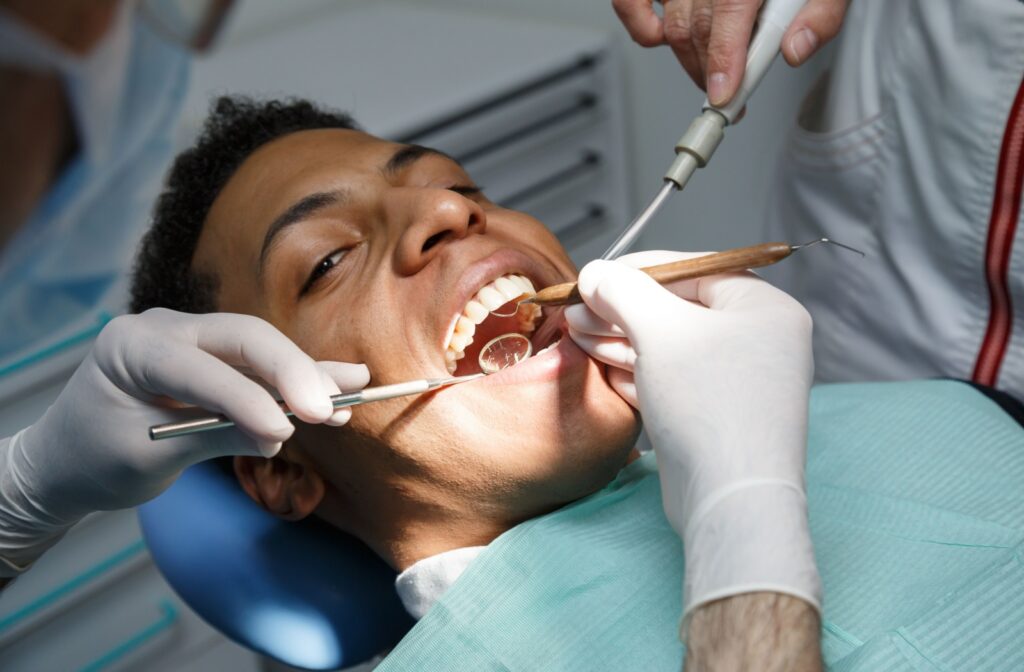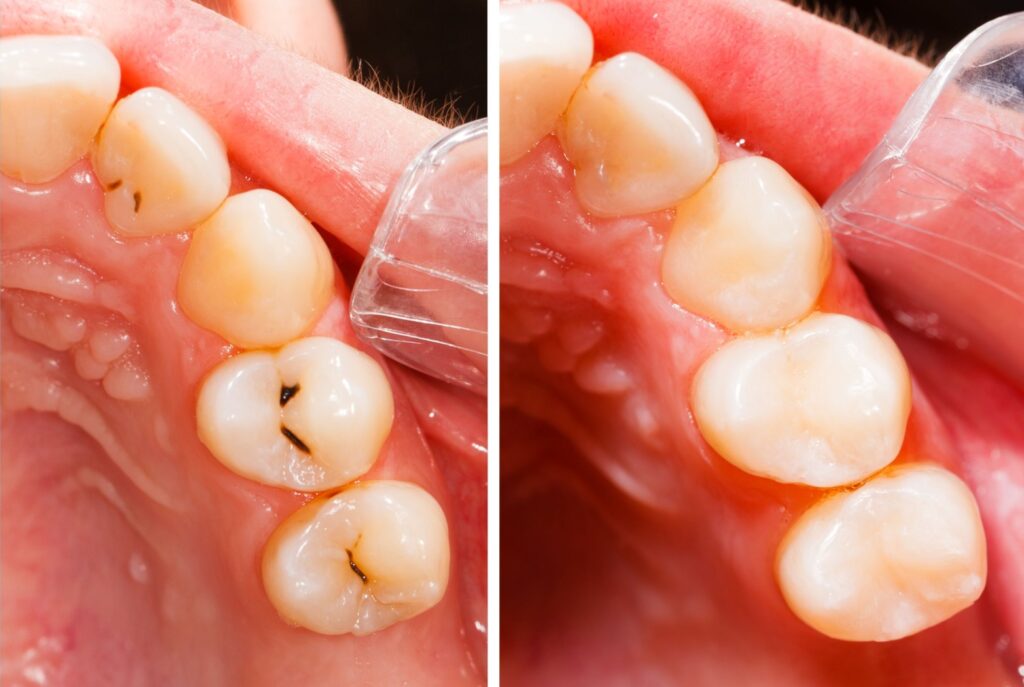Cavities can develop even if you practice a stringent oral hygiene routine. In fact, certain everyday activities, like sharing food or swapping drinks, can have negative effects on your oral health.
When you share saliva, you increase your risk of developing a cavity. While you cannot “catch” a cavity like a cold or flu, you can contract or transmit cavity-causing bacteria through saliva.
Being mindful of your social habits and making regular visits to your dentist can go a long way to protect your teeth and gums.
How Cavities Can Spread
A cavity itself is not infectious, but bacteria that cause cavities, such as Streptococcus mutans, are. These bacteria transfer from one person to another through exchanging saliva.
These are some ways cavity-causing bacteria can spread:
- Sharing utensils: Using the same fork, spoon, or straw as someone else can transfer oral bacteria.
- Kissing: Close contact involving saliva, such as kissing, can transmit bacteria that cause cavities.
- Blowing on food: Parents or caregivers may blow on food to cool it down, inadvertently passing bacteria to a child.
- Chewing on the same items: Sharing items such as toothbrushes, drinks, or even chewing gum can provide a pathway for bacteria.
If you come into contact with someone with a cavity and share saliva with them, you could be at risk of developing the same type of bacteria that caused their cavity.
Staying mindful about sharing food or utensils can go a long way in protecting your oral health.
Signs You Might Have a Cavity
Cavities can develop silently at first, even after you take all possible precautions. Common symptoms of a cavity may include:
- Tooth sensitivity: Discomfort when consuming hot, cold, or sweet foods and beverages.
- Visible holes or dark spots: Small pits or discoloured areas on teeth are signs of enamel damage.
- Toothache: Persistent or sharp pain might indicate an untreated cavity.
- Bad breath or unpleasant taste: These occur due to the presence of food or decay.
- Swelling or tender gums: Though less common, a cavity near the gum line can cause irritation.
If you notice any of these signs, act quickly. Delaying treatment allows cavities to grow and penetrate deeper into the tooth, potentially leading to more significant damage, discomfort, and complications.
Early action minimizes the need for extensive procedures, keeping you more comfortable in the exam chair.

Cavity Treatment Options
A dentist can treat cavities, but there are several avenues for treatment. The right method depends on the stage of the cavity, the extent of decay, and your overall oral health.
White Fillings
White fillings blend seamlessly with natural teeth, making them visually appealing. Fillings preserve most of the natural tooth and are ideal when decay is minimal.
Crowns & Onlays
As decay worsens, fillings are no longer an option. Crowns and onlays are used in cases of extensive damage to restore the tooth’s structure and strengthen damaged teeth.
Root Canal Therapy
Once decay reaches the tooth’s pulp and causes an infection, a root canal may be necessary to save the tooth. Root canals are very effective in eliminating pain and restoring oral health.
Preventing Cavities
If you are worried about the spread of cavities, there are effective measures you can take to keep safe and protect your oral health. These start with consistent dental hygiene and healthy lifestyle choices.
Practice Daily Oral Hygiene
Cavities develop when harmful bacteria in your mouth produce acids that attack tooth enamel. These bacteria feed on leftover food (sugar and starch) that builds up throughout the day.
Daily oral hygiene helps keep your mouth free of bacteria while effectively removing the debris (food, plaque) that accumulates after you eat. Brushing twice a day (morning and night) for at least 2 minutes is great, but do not underestimate the value of daily flossing.
Flossing complements brushing by reaching areas the bristles of a toothbrush cannot, such as between teeth and below the gumline, where plaque tends to hide. Finishing with mouthwash helps reduce plaque and kill bacteria, leaving your teeth fresh.
Visit Your Dentist Regularly
Even with a meticulous oral hygiene routine, you can still develop oral health concerns. A routine dental cleaning and exam every 6 months helps address areas that the bristles of your brush or floss thread may have missed.
With a comprehensive exam and X-rays , your dentist can identify potential concerns early, such as cavities, before they snowball into more complex issues.
Keep Your Diet Tooth-Friendly
Cavity-causing bacteria feed on sugars and starch left behind on your teeth and gums. Adopting healthy food habits, like eating less sugary and acidic foods, can keep harmful bacteria from thriving.
Instead, choose nutritious foods like fruits, vegetables, and dairy to support strong teeth and healthy enamel.
Do Not Share Saliva-Contaminated Items
Encourage everyone in your household to avoid sharing utensils, toothbrushes, or other items with saliva contact.
This simple precaution can help minimize the spread of harmful bacteria.
Take Control of Your Oral Health
Cavities are common, but there are proactive measures you can take to reduce your risk of developing them. Spreading harmful bacteria is just one piece of the puzzle. Adopting tooth-friendly habits also includes regular visits to your dentist.
If you suspect you have a cavity, or it has been a while since you have sat in an exam chair, Cooper Dental is here to help.
Connect with our team to book an appointment for your routine dental exam and cleaning.




